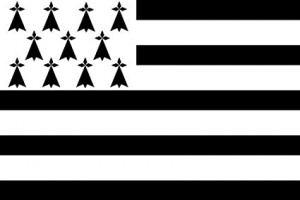Language/Breton/Grammar/Future-Tense
Hi Breton learners! 😊
In this lesson, we will be exploring the future tense in Breton grammar.
After mastering this lesson, these related pages might interest you: Plurals & Adjectives.
What is the Future Tense in Breton?[edit | edit source]
The future tense is used to express actions that will take place at some point in the future. In Breton, the future tense is created by using the verb a vo followed by the infinitive of the main verb.
Here is an example:
| Breton | Pronunciation | English |
|---|---|---|
| Ec'h adskoaz da labourat | [ɛx adskwa:z da labo'rat] | I will start working |
In this example, the future tense is created by using the verb a vo followed by the infinitive labourat, meaning "to work".
How to Form the Future Tense in Breton[edit | edit source]
To form the future tense in Breton, follow these steps:
1. Take the verb you want to use in the future tense and remove the endings (such as -an or -ez).
2. Add a vo to the stem of the verb. For example, for labourat (to work), the stem would be labour.
3. Add the personal endings for the future tense:
| Person | Breton | Pronunciation | English | ||||||||||||||||||||
|---|---|---|---|---|---|---|---|---|---|---|---|---|---|---|---|---|---|---|---|---|---|---|---|
| 1st singular | Ec'h vene da ... | [ɛx ve:'ne da ...] | I will ... | 2nd singular | Ec'h vini da ... | [ɛx vi:'ni da ...] | You will ... | 3rd singular | Ec'h voe da ... | [ɛx vo:'e da ...] | He/She/It will ... | 1st plural | Ec'h vonit da ... | [ɛx vo'niːt da ...] | We will ... | 2nd plural | Ec'h vonoc'h da ... | [ɛx vo'no:x da ...] | You all will ... | 3rd plural | Ec'h vonont da ... | [ɛx vo'nont da ...] | They will ... |
4. Add the infinitive of the main verb after the personal ending.
Here are some more examples:
| Breton | Pronunciation | English |
|---|---|---|
| Da vont amañ | [da von't amaɲ] | I will come here |
| Ec'h vonene da gervel | [ɛx vo'neː.ne da ɡɛr'vel] | We will try |
| Ec'h vonoc'h da gousket | [ɛx von'o:x da ɡuskɛt] | You all will sleep |
As you can see, the future tense in Breton is relatively straightforward once you understand the pattern.
Irregular Future Tense Verbs in Breton[edit | edit source]
While the majority of verbs in Breton follow the regular pattern when it comes to forming the future tense, there are a few irregular verbs that require a different approach. Here are a few examples:
- Bezañ (to be):
| Person | Breton | Pronunciation | English | ||||||||||||||||||||
|---|---|---|---|---|---|---|---|---|---|---|---|---|---|---|---|---|---|---|---|---|---|---|---|
| 1st singular | Ec'h vo pevar | [ɛx vo 'pɛvɑr] | I will be | 2nd singular | Ec'h vo pevas | [ɛx vo 'pɛvɑs] | You will be | 3rd singular | Ec'h vo peus | [ɛx vo 'pøːs] | He/She/It will be | 1st plural | Ec'h vo pemdez | [ɛx vo 'pɛmdɛs] | We will be | 2nd plural | Ec'h vo pevomp | [ɛx vo 'pɛvɔ̃np] | You all will be | 3rd plural | Ec'h vo penaos | [ɛx vo pɛˈnows] | They will be |
- Kaout (to have):
| Person | Breton | Pronunciation | English | ||||||||||||||||||||
|---|---|---|---|---|---|---|---|---|---|---|---|---|---|---|---|---|---|---|---|---|---|---|---|
| 1st singular | Ec'h vo kavet | [ɛx vo ka:'vɛt] | I will have | 2nd singular | Ec'h vo kavas | [ɛx vo ka:'vɑz] | You will have | 3rd singular | Ec'h vo kav | [ɛx vo ka:v] | He/She/It will have | 1st plural | Ec'h vo kavomp | [ɛx vo ka'vɔmp] | We will have | 2nd plural | Ec'h vo kavoc'h | [ɛx vo ka'vo:x] | You all will have | 3rd plural | Ec'h vo kavont | [ɛx vo ka'vɔnt] | They will have |
- Ober (to do):
| Person | Breton | Pronunciation | English | ||||||||||||||||||||
|---|---|---|---|---|---|---|---|---|---|---|---|---|---|---|---|---|---|---|---|---|---|---|---|
| 1st singular | Ec'h vo graet | [ɛx vo 'grɛːt] | I will do | 2nd singular | Ec'h vo graet | [ɛx vo 'grɛːt] | You will do | 3rd singular | Ec'h vo graet | [ɛx vo 'grɛːt] | He/She/It will do | 1st plural | Ec'h vo graet | [ɛx vo 'grɛːt] | We will do | 2nd plural | Ec'h vo graet | [ɛx vo 'grɛːt] | You all will do | 3rd plural | Ec'h vo graet | [ɛx vo 'grɛːt] | They will do |
Using the Future Tense in Conversation[edit | edit source]
Let's take a look at a dialogue to see how the future tense can be used in context:
- Person 1: Ec'h adskoaz da labourat. ([I will start working])
- Person 2: Mat eo, me zo o vont da varc'hiañ dre an douar hiziv. ([Ok, I'm going to walk around the countryside today.])
In this example, person 1 uses the future tense to express their intention to start working. Person 2 then responds with a plan to walk around the countryside, also using the future tense with me zo o vont da (I am going to...).
Remember, the Breton language is not only a tool for communication, but also a way to understand the Breton culture and its traditions.
To improve your Breton Grammar, you can also use the Polyglot Club website. Find native speakers and ask them any questions!
Sources[edit | edit source]
- Breton grammar - Wikipedia
- Breton Grammar - Future Tense
- Perfective Marking in the Breton Tense-Aspect System
Other Lessons[edit | edit source]
- Gender
- Plurals
- Pronouns
- How to Use Be
- Give your Opinion
- Negation
- Conditional Mood
- Personal Pronouns
- How to Use Have

